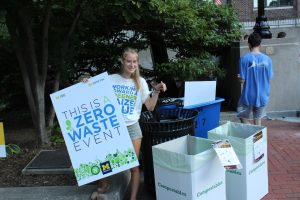Michigan Dining is committed to purchasing, reusing, recycling, and composting strategies that promote long-term waste eradication in every step of the process.
MDining has achieved the campus goal of 40% landfill diversion by 2025.
Reducing Food Waste
- Dining halls serve food in a trayless, small-plate style to incentivize students to take only what they will eat to reduce food waste. Made-to-order foods such as omelets, stir-fries, sandwiches and more, let students choose exactly what they want so nothing goes to waste.

- MDining’s Just Ask program means that every dish in our dining halls and cafés is customizable and our staff are happy to make adjustments. Students can customize their dish so they get what you want and save what they won’t eat for another Wolverine.
- All pre- and post-consumer food scraps are composted in dining halls. Compost is sent to the Wixom Compost Center operated by Spurt Industries where it’s turned into compost, mulch, and topsoil.

- Partnership with Food Recovery Network allows uneaten perishable food from MDining locations to be collected and redistributed to fight food waste and food insecurity.
- At the end of each term, MDining donates food we cannot use to Food Gatherers, a food rescue and food bank program serving Washtenaw County.
Reducing Other Waste
- In retail units, compostable containers are used for Blue-to-Go packaged food and beverages. Compost bins are available for customers to responsibly dispose of cups, containers, and other Michigan Dining packaging.
- UMich partners with an outside source to recycle used fryer oil for recycled biodiesel fuel and animal feed.
- Wherever possible, single-use plastics are eliminated and replaced with compostable materials or reusable plastics.
- All newly constructed and recently renovated dining halls were built using energy-saving appliances and heating/cooling systems, recycled finishes and furniture. For example, the orange chairs at South Quad were made from recycled Coca-Cola bottles and the high top tables were made from reclaimed bowling alleys.
- Students, staff, and faculty are educated on the proper disposal of all materials through the Know Where to Throw campaign.
- MDining partners with the Office of Campus Sustainability to aid students in hosting Zero-Waste Events where waste reduction and landfill diversion are emphasized.


